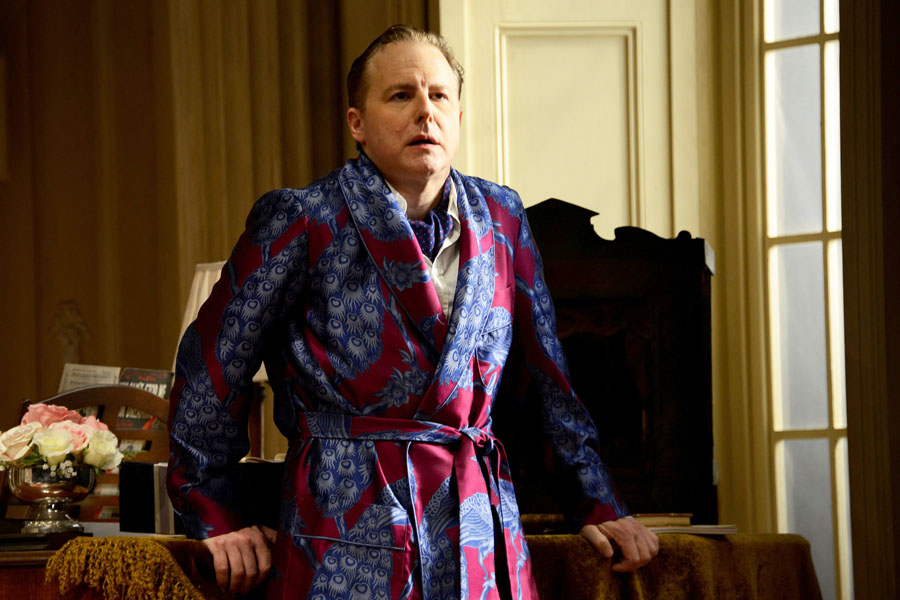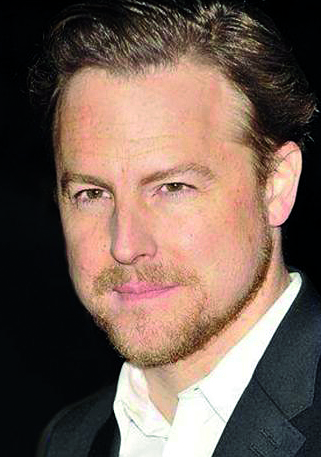
Samuel West, who is currently appearing in Noël Coward’s Present Laughter at Malvern Theatres, is part of a theatrical family. His mother is Prunella Scales and his father is Timothy West. Samuel’s character in Present Laughter, Garry Essendine, is also an actor . . .
How would you sum up the character of Garry in Present Laughter?
He’s a famous actor going through a bit of a midlife crisis. He’s just turned 40 and there’s an endless stream of debutantes and one-night stands that run through his studio flat in London. His ex-wife, who he’s never quite got round to divorcing, descends on him and says ‘Listen, this is a bit undignified and it isn’t good for our firm’. He’s still a very successful man. He’s surrounded by old friends and there’s been a lot of blood under the bridge in the 20 years they’ve known each other, so they try and get Garry to dwindle comfortably into middle age and he fights that a little bit. Meanwhile he’s surrounded by a lot of people who want a piece of him. Noël Coward wrote it for himself. He directed the first production and he played Garry so it’s quite autobiographical.
Have you performed in the play before?
I never have. In fact, apart from on the radio I’ve never done a play by Coward before. He’s an amazing writer – very funny but also very truthful. Of course there’s a lot of style and wit and glister on top but if you look deeper there’s always a human soul to his work, which is what makes it matter.
What are the joys for you as an actor when it comes to Noël Coward’s sublime writing?
The play is extremely funny and that’s always nice. We’ve got an amazing company because Coward didn’t just write good parts for himself, he wrote a lot of excellent parts around that. There’s a heart underneath his work, as I say, and I think the heart of this play is about friendship and experience and how if you’ve reached that point in your life, without taking too many drugs or throwing yourself off a bridge or something, you find yourself looking around thinking, ‘What really matters to me?’. Sometimes you don’t realise it because you’re addicted to the one-night stands so then your friends have to say ‘Look mate, you’re 40 now’ – and I’ve just turned 50, so if 50 is the new 40 I’m the right age to play this part. There are no children in the play, of course; Coward being gay would have written a lot of these characters with same-sex relationships in mind so there are certainly no children to muddy the waters in that respect. It’s beautiful structured – very funny and fast-moving and it’s all on one set, but it has at its heart a story about what really what matters in a man’s life.
Do you think that’s why the play, which was written in 1939 and first performed in 1942, has endured?
1939 was a very interesting time to do a play. They actually started rehearsals just before the Second World War broke out, but they weren’t able to open because the theatres were closed. They’re very interesting for people of that age who were too young to fight in the First World War and too old to fight in the Second. They spend their 20s, in the 1920s, being very fast, dancing, doing drugs and having sex with each other. Then they get to the late 1930s and they think ‘My God, there’s been a Great Depression and civil war in Spain and fascist fighting on the streets of London and all we’ve done is dance, be funny, smoke cigarettes and walk around in dressing gowns – we should really have done something more important’. Although the play isn’t about that, it’s very much behind it. There’s an intense young dramatist called Roland Maule who comes on and says to the Coward figure ‘All you do is stand around in dressing gowns, posing and being funny’. He’s really quite merciless to the Coward figure and although he doesn’t win the argument Coward realises there are other things out there – there are other things going on – but at the same time he realises the most important thing is there in the title ‘Present Laughter’, which comes from a song by the Fool in Twelfth Night about present life being present laughter and youth is the stuff that will not endure. In other words ‘You’re not going to be young forever so laugh now because tomorrow we die’. Coward is saying to take your enjoyment where you can get it but don’t be afraid to face the truth when it slaps you in the face.
Have you worked with Phyllis Logan, who plays your secretary Monica, before?
I haven’t and it’s delightful. There are quite a lot of letters in the play, our stage management have written the letters for us and Phyllis and myself were saying how funny it is that they’ve bothered to write proper letters rather than just scrawls on bits of paper. It was the same on Mr Selfridge for me and Downton Abbey for Phyllis. Very often you had people working on paper props or on handwritten letters who had not only gotten the handwriting of the period right and the graphics of the headed notepaper or whatever, they’d actually done enough in the letter or newspaper for you to be able to go in close-up and feature the newspaper knowing the story was OK and you wouldn’t have to hide it because it just went ‘Blah, blah, blah’. That’s a really nice touch.
Garry is a bit of a cad. That must be fun to play?
Yes, absolutely. ‘Cad’ is a very good description. In fact somebody calls him that just before slapping him across the face in the play. He’s also very much a man of the theatre. Coward had a very interesting relationship with the theatre. I think he loved it but he also in a quite healthy way hated it and hated its insularity and its bitchiness. He’s not afraid to send it up, but at the same time Garry is a man who is absolutely involved in it. In the late 1930s there weren’t really many British film stars in Britain. Most of the ones who were famous had gone to Hollywood, so Garry as a sort of matinee idol who can run a play for 18 months in the West End or tour for six months through the provinces – as they would have called them then – is a proper big star but yet he doesn’t have security like he would nowadays. He invites people into his flat in London. They know his address and his secretary opens the door to them. They come to his flat in Eton Square and he has meetings with them so he’s both very famous and also quite reachable. Like I said, everyone wants a piece of him so he’s constantly going ‘I don’t have a moment’s peace, I can’t hear myself think’ and yet if there weren’t people loving him or adoring him, as his secretary points out, there’d be hell to pay. Like a lot of actors he’s insecure and needs to be worshipped.
What’s the one thing you have to have on tour with you?
[Laughs] Funnily enough what I normally like to tour with is a really good dressing gown, but of course I get nothing but dressing gowns in this play. I get to wear three or four and the character is described as owning 18. So I shall probably just have a T-shirt and jogging bottoms with me on this tour. We’re doing quite a lot of commuting from London but the times I’m staying away all I’ll need to have with me are my partner and two-year-old daughter. I wouldn’t be much good for a week away if I wasn’t going to see them.
Do you have any pre- and post- show routines?
I always warm up. Not everyone does but I like going down to the theatre before a show. I always brush my teeth, turn the lights out in my dressing room and check my flies, sometimes several times, before I go on. I also tend to take the thing of getting into costume quite seriously. When I’m warmed up and putting the costume on I like to think about them being clothes, not costumes, belonging to the person I’m about to play. I like the idea of getting into character as you get into your clothes. And after a show? When I played Hamlet at the RSC I had a post-performance routine of a pint of Stella and a bag of Pork Scratchings. I was 35 years old and it was quite an energetic part so I knew I wasn’t going to gain too much weight by stuffing myself with pork fat and alcohol. But nowadays I try and eat before the show and when you have a baby who wakes up at 7am you don’t want to burn the candle at both ends. My partner, who is a writer, tends to write in the mornings so once we open the show I’ll need to be looking after our daughter in the mornings. Probably my post-performance routine is going to be getting into my bed as quickly as possible.
As a director yourself what are you learning from working with [Present Laughter director] Stephen Unwin?
I’ve worked with Stephen before and the nice thing about having been a director is when you put yourself in the hands of somebody you trust you may know a bit better than some people what difficulties they’re struggling with, but you’re also more than usually grateful that those difficulties aren’t yours. I can sit there thinking ‘This is quite a difficult scene change’ then ‘Bye, I’m going home to learn my lines’. [Laughs] It’s not my problem. I know exactly what his problem is but I’ve got plenty to do learning my lines. But Stephen and I are old friends and it’s a real pleasure, plus it’s the first time we’ve worked together for nearly 20 years. He’s directed my dad many times as well.
You’ve had a long and varied career. What have been the highlights?
I played Hamlet for a year and I think that would have to be a highlight. I performed at the Last Night Of The Proms, which was pretty amazing. You get 6,000 people in front of you and about 50 million watching around the world. And I’ve been in Doctor Who, which was always one of my ambitions. I’ve had nice medium-sized parts in films I’m very proud of being a part of, like Persuasion, Notting Hill and Howards End. I think those are terrific films and even though I don’t have a massive amount to do in any of them they’re good examples of what they are and I was delighted to be involved. I try not to look back on stuff too often. You never get a pension as an actor and you’re only as good as your next job so you have to keep looking forward. Recently I’ve started working with musicians a lot more and really expanding the nature of the work I do as a narrator with orchestras. I’m finding it fascinating. It’s difficult and challenging stuff and I find it as interesting as anything else I’ve ever done.
Photo by Nobby Clark


